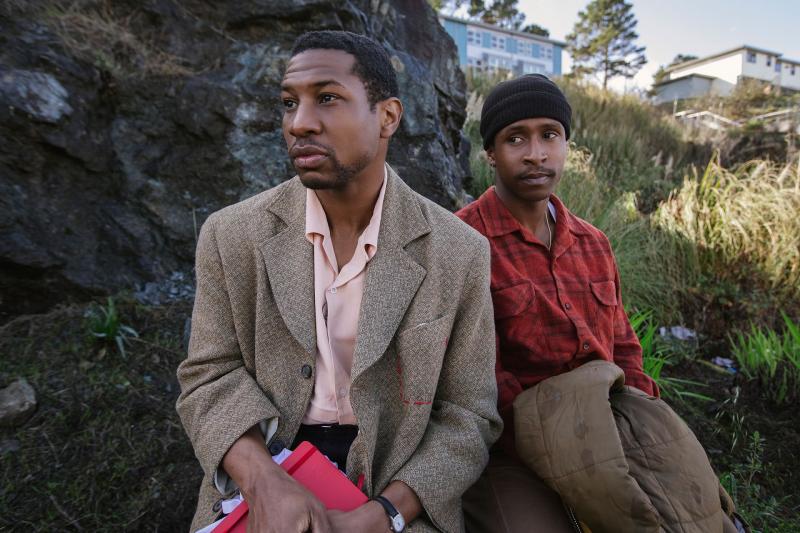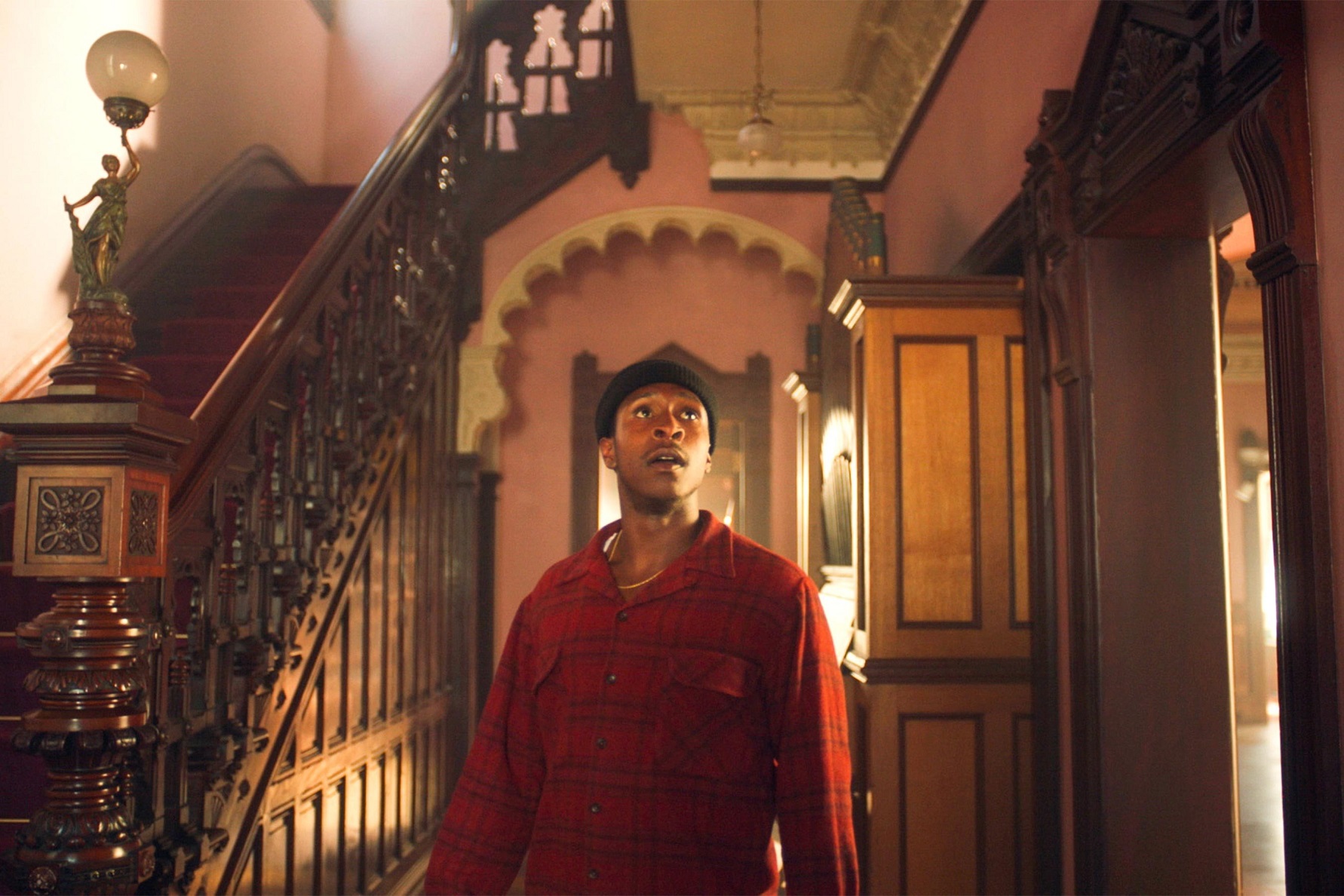The Last Black Man in San Francisco review - gentle gentrification blues | reviews, news & interviews
The Last Black Man in San Francisco review - gentle gentrification blues
The Last Black Man in San Francisco review - gentle gentrification blues
A conflicted love letter to San Francisco, as it prices out its citizens and soul

San Francisco has rarely looked more unattainably golden than in Joe Talbot’s Sundance prize-winning gentrification parable.
It’s a discursive, ambulatory yarn, as Jimmie and best friend Mont (Jonathan Majors) regularly trek from their black exile in the Bay Area’s isolated tip, Hunters Point, back to his former Fillmore home. Mont is a geeky, besuited, would-be playwright, Jimmie a sad-eyed, gentle skateboarder. Both are outsiders either way, viewed with suspicion amidst the street language and macho fronts of black friends in Hunters Point, and in genteel, white Fillmore. The ex-hippie sitting tenants are baffled by Jimmie’s proprietorial guerrilla repairs to their home, hurling bakery products at their unwanted painter and decorator. Soon their permanency too proves an illusion, and Jimmie and Mont move into the abandoned house. Dust showers down as Jimmie plays its organ, and returns his dad’s old possessions to bring the belonging he felt there back to life. The castle-like building becomes the backdrop to a delusional fairy tale, a Canute-like stand against rapacious real estate.
The ex-hippie sitting tenants are baffled by Jimmie’s proprietorial guerrilla repairs to their home, hurling bakery products at their unwanted painter and decorator. Soon their permanency too proves an illusion, and Jimmie and Mont move into the abandoned house. Dust showers down as Jimmie plays its organ, and returns his dad’s old possessions to bring the belonging he felt there back to life. The castle-like building becomes the backdrop to a delusional fairy tale, a Canute-like stand against rapacious real estate.
Spike Lee tackled Hunters Point’s tensions in Sucker Free City (2004), but Talbot and Fails are more phantasmagorical than a Lee or Loach, letting musicians and homeless people caper in slow-motion, a soapbox preacher rail against iniquity, and ex-Dead Kennedy Jello Biafra cameo as a slimily condescending tour guide. Mont, too, sees the people around him as a play which a crisis finally drives him to write. His own part in it is what confuses him, as confrontational language boils over among his black neighbours, and he talks to his dislocated self in a mirror. Music naturally fills this Frisco film. A spectral, vengeful remix of Jefferson Airplane’s “Somebody to Love” chases Jimmie as he angrily skates downhill, while Mike Marshall’s street-corner soul version of the touristic “San Francisco (Be Sure To Wear Flowers In Your Hair)” ironically emphasises the “gentle people there”. The furtive eyes of Jimmie’s lost mother when they bump into each other on a bus, and the steam which fills the screen as its doors open onto wailing tragedy, fits a film in which characters peer from windows like ghosts, viewing living worlds they’re locked out of. “They thought they owned that shit,” Jimmie says bitterly of his family’s good days, in a nation where mass foreclosures to force out unwelcome old residents are cynically violent, from New Orleans to the one-time easy-living hippie capital.
Music naturally fills this Frisco film. A spectral, vengeful remix of Jefferson Airplane’s “Somebody to Love” chases Jimmie as he angrily skates downhill, while Mike Marshall’s street-corner soul version of the touristic “San Francisco (Be Sure To Wear Flowers In Your Hair)” ironically emphasises the “gentle people there”. The furtive eyes of Jimmie’s lost mother when they bump into each other on a bus, and the steam which fills the screen as its doors open onto wailing tragedy, fits a film in which characters peer from windows like ghosts, viewing living worlds they’re locked out of. “They thought they owned that shit,” Jimmie says bitterly of his family’s good days, in a nation where mass foreclosures to force out unwelcome old residents are cynically violent, from New Orleans to the one-time easy-living hippie capital.
The anger in Talbot’s film is diluted by the desire to write a locals’ love letter to the city. Like Mont’s writing it doesn’t quite come off, reaching for an old problem play’s histrionics one minute, and gentle as a Daisy Age flower the next. If it doesn’t all cohere, first-time actor Fails has a hurt soulfulness deeper than his surroundings. And if it is itself a touch gentrified, this matches its characters’ aspirations beyond their social boxes, leaving a sweet and kindly aftertaste.
rating
Explore topics
Share this article
The future of Arts Journalism
You can stop theartsdesk.com closing!
We urgently need financing to survive. Our fundraising drive has thus far raised £49,000 but we need to reach £100,000 or we will be forced to close. Please contribute here: https://gofund.me/c3f6033d
And if you can forward this information to anyone who might assist, we’d be grateful.

Subscribe to theartsdesk.com
Thank you for continuing to read our work on theartsdesk.com. For unlimited access to every article in its entirety, including our archive of more than 15,000 pieces, we're asking for £5 per month or £40 per year. We feel it's a very good deal, and hope you do too.
To take a subscription now simply click here.
And if you're looking for that extra gift for a friend or family member, why not treat them to a theartsdesk.com gift subscription?
more Film
 One Battle After Another review - Paul Thomas Anderson satirises America's culture wars
Leonardo DiCaprio, Teyana Taylor, and Sean Penn star in a rollercoasting political thriller
One Battle After Another review - Paul Thomas Anderson satirises America's culture wars
Leonardo DiCaprio, Teyana Taylor, and Sean Penn star in a rollercoasting political thriller
 Steve review - educator in crisis
Cillian Murphy excels as a troubled headmaster working with delinquent boys
Steve review - educator in crisis
Cillian Murphy excels as a troubled headmaster working with delinquent boys
 Can I get a Witness? review - time to die before you get old
Ann Marie Fleming directs Sandra Oh in dystopian fantasy that fails to ignite
Can I get a Witness? review - time to die before you get old
Ann Marie Fleming directs Sandra Oh in dystopian fantasy that fails to ignite
 Happyend review - the kids are never alright
In this futuristic blackboard jungle everything is a bit too manicured
Happyend review - the kids are never alright
In this futuristic blackboard jungle everything is a bit too manicured
 Robert Redford (1936-2025)
The star was more admired within the screen trade than by the critics
Robert Redford (1936-2025)
The star was more admired within the screen trade than by the critics
 Blu-ray: The Sons of Great Bear
DEFA's first 'Red Western': a revisionist take on colonial expansion
Blu-ray: The Sons of Great Bear
DEFA's first 'Red Western': a revisionist take on colonial expansion
 Spinal Tap II: The End Continues review - comedy rock band fails to revive past glories
Belated satirical sequel runs out of gas
Spinal Tap II: The End Continues review - comedy rock band fails to revive past glories
Belated satirical sequel runs out of gas
 Downton Abbey: The Grand Finale review - an attemptedly elegiac final chapter haunted by its past
Noel Coward is a welcome visitor to the insular world of the hit series
Downton Abbey: The Grand Finale review - an attemptedly elegiac final chapter haunted by its past
Noel Coward is a welcome visitor to the insular world of the hit series
 Islands review - sunshine noir serves an ace
Sam Riley is the holiday resort tennis pro in over his head
Islands review - sunshine noir serves an ace
Sam Riley is the holiday resort tennis pro in over his head
 theartsdesk Q&A: actor Sam Riley on playing a washed-up loner in the thriller 'Islands'
The actor discusses his love of self-destructive characters and the problem with fame
theartsdesk Q&A: actor Sam Riley on playing a washed-up loner in the thriller 'Islands'
The actor discusses his love of self-destructive characters and the problem with fame
 Honey Don’t! review - film noir in the bright sun
A Coen brother with a blood-simple gumshoe caper
Honey Don’t! review - film noir in the bright sun
A Coen brother with a blood-simple gumshoe caper

Add comment